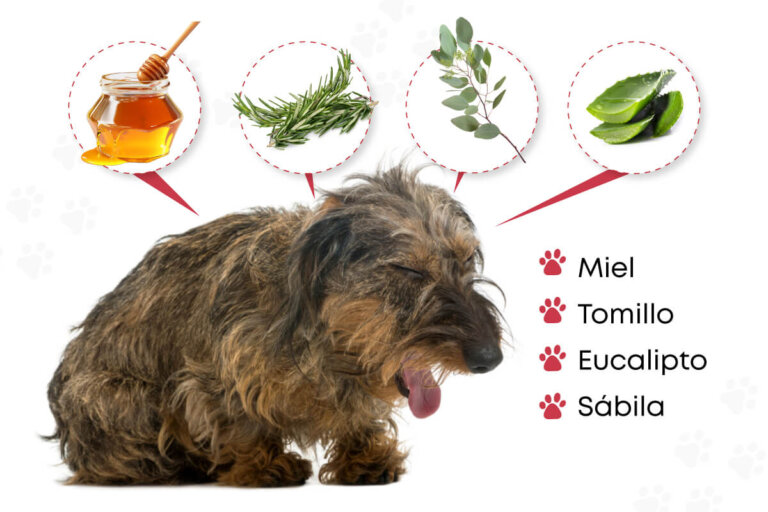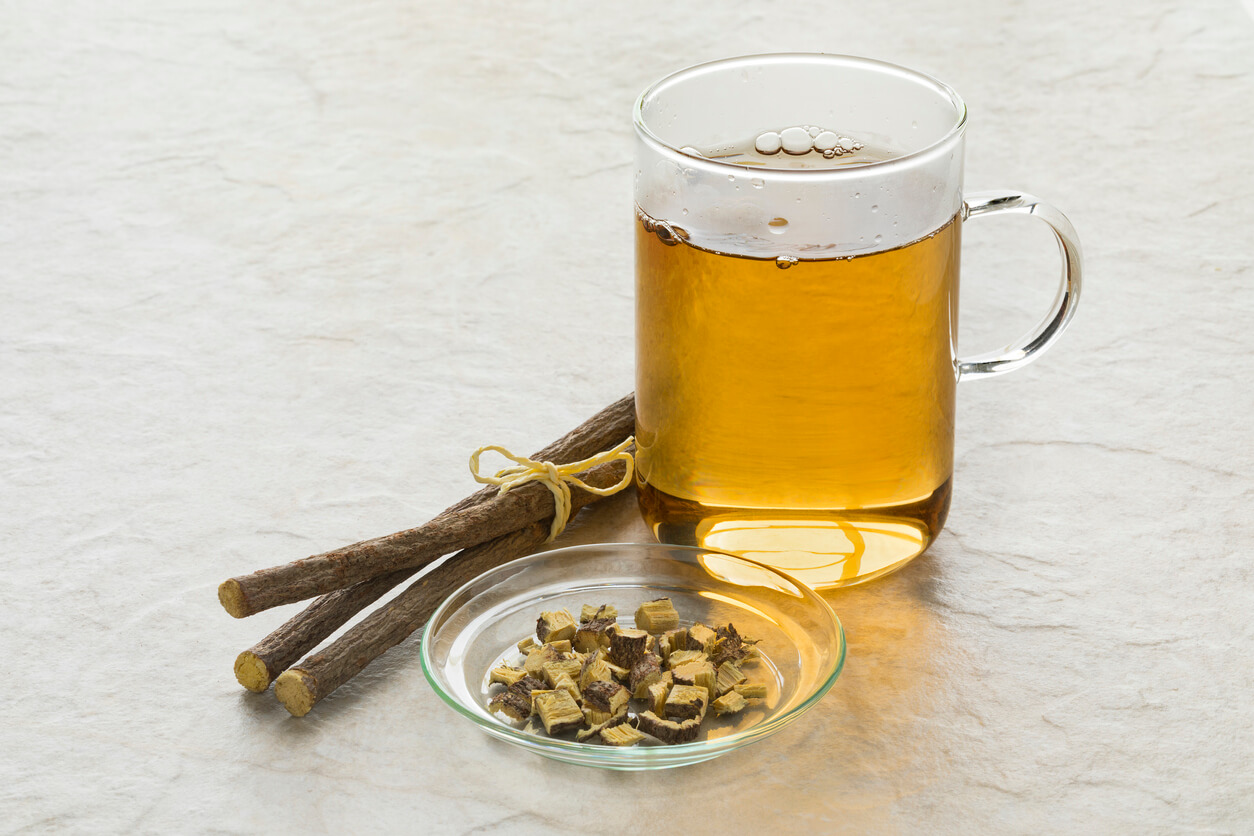9 Home Remedies for Kennel Cough

Honey, thyme, aloe vera, and eucalyptus are some of the home remedies for kennel cough that offer relief to your pet. The origin of this respiratory disease, also known as canine infectious tracheobronchitis, is variable, so it’s currently known as Canine Infectious Respiratory Complex (CRIC).
The agents most involved in this disease are certain viruses and bacteria. Faced with this, the key recommendation is to go to the veterinarian to make a timely diagnosis and treatment.
If your dog suffers from the discomfort of this condition, keep reading to discover nine home treatments that you can administer to your pet–always with the consent of a professional. Let’s get to work!
Kennel cough: A treatable disease
Kennel cough is similar to the flu or cold in dogs, which your dog has surely experienced at some point. Here, as the name implies, affected animals experience a dry and persistent cough as the main sign of the illness. They may also present the following symptoms:
- Fever
- Lethargy
- Sneezing
- Lack of appetite
- Weight loss
- Nasal and eye discharge
Although it’s not a serious disease, and the vast majority of dogs recover within a few weeks, some dogs can have a very bad time when the infection worsens because it makes breathing difficult. This is much more serious in brachycephalic breeds, young dogs, geriatric dogs, or those with a compromised immune system.
However, the importance of this disease doesn’t lie in its severity but in how highly contagious and uncomfortable it can be, both for the animals and their guardians. Despite this, it can be treated without major complications.
Treatments at home: Comfort at your fingertips
Here’s a list of home remedies for kennel cough that’ll help your dog with the bothersome signs, reduce your concern, provide welfare, and also avoid possible complications. These recipes are very simple, can be prepared at home, and won’t put your furry friend’s health at risk.
1. Honey

The benefits of honey for dogs are numerous. This natural substance – known for its antibacterial, anti-inflammatory, and soothing properties – can relieve coughs and soothe your furry one’s sore throat. Just add a teaspoon of pure honey to your pet’s drinking water or food, or look for syrups composed of this ingredient.
You have to keep in mind that honey is high in sugar, so you should adjust your animal’s diet to avoid problems such as obesity, excess weight, or dental problems. In addition to this, you must make sure you’re giving your dog pure honey that’s free of additives or flavorings.
2. Chicken broth
You should prepare chicken broth for your dog without salt, onion, or seasoning so that it’s completely safe for your dog. Among the benefits for your dog are the following:
- It refreshes the throat.
- It provides calories and protein.
- It helps replenish fluids lost through fever, vomiting, or diarrhea, which can lead to severe episodes of dehydration.
Dogs love chicken, and no matter how little appetite they have, they won’t be able to resist this preparation.
An additional recommendation is to avoid commercial chicken broth and prepare it yourself at home, as store-bought broth may contain high amounts of sodium or additives, which can be detrimental to your pet’s health.
3. Propolis
Although many people may be unaware of the uses of this substance, propolis is beneficial to dogs. Produced by bee hives, it stands out as an excellent home remedy, thanks to the following properties that help strengthen the immune system:
- Antiviral
- Antimicrobial
- Anti-inflammatory
Although it can be found in presentations such as liquid extracts or nutritional supplements, the presentation in the form of small granules is the most used. Just add a teaspoon to your dog’s food.
It is important that, as with honey, you make sure that the product is natural and that it’s free of additives.
4. Echinacea

Echinacea plants, belonging to the daisy family, have been used in traditional medicine since ancient times. It’s a natural and safe alternative for canines suffering from kennel cough.
In fact, an article by Autonomic & Autacoid Pharmacology aimed at evaluating its effects on the immune system of dogs has shown that extracts of this plant have appreciable immunostimulatory activity. In addition, echinacea has several properties:
- Antiviral
- Analgesic
- Antibacterial
- Anti-inflammatory
If you’re wondering where to get it, keep in mind that its use in human medicine is so popular that it can be found in capsules, liquid extracts, or powder to dilute in water, which facilitates not only the administration to the dog but also the location of the product in health food stores or pharmacies.
5. Aloe vera
Among the benefits of aloe vera for pets are its anti-inflammatory and refreshing properties, which relieve throat irritation. Despite these benefits, it’s essential that you watch the amount you offer to your dog, as it can be toxic when administered in large quantities, generating the following manifestations:
- Vomiting
- Diarrhea
- Irritations
- Redness
It should be administered in small amounts in your dog’s food. Make sure it’s as pure as possible, and keep an eye out for any behavioral changes in your pet.
6. Thyme
Thyme stands out for its well-known medicinal properties, thanks to two of its chemical compounds (thymol and carvacrol). Thyme has anti-inflammatory, antispasmodic, antibacterial, and antifungal properties. The latter are effective in inhibiting the harmful effects of the Staphylococcus aureus strain.
It’s also used as an expectorant, so it’s very desirable to treat respiratory diseases. To administer it to your pet, you must prepare an infusion with dried or fresh thyme and hot water. Once it’s ready, let it steep for 10 minutes. When it cools, you can mix it with the drinking water, or you can offer it in a spoon.
As for the precautions you should take, some dogs may experience an allergic reaction, which manifests as itching, reddening of the skin, or inflammation.
In addition, it’s important to consult with your veterinarian, as some components of thyme can interfere with some medications and affect the treatment of your pet.
7. Eucalyptus
In traditional medicine, eucalyptus is known as an antiseptic, expectorant, and decongestant of the respiratory tract. This is of great help for those dogs that have a runny nose and difficulty breathing.
One of the main advantages of this option that stands out among the home remedies for kennel cough is that it’s easy to find and in different presentations, ranging from essential oils for aromatherapy, ointments, and creams to other topical products. In addition, its leaves, flowers, and fruits can be used to vaporize and help clear the airways.
You should pay attention to the concentration in which you use eucalyptus and also keep your dog from ingesting any part of the plant or its essential oil, as it can produce the following manifestations:
- Vomiting
- Diarrhea
- Irritation
- Salivation
- Muscle weakness
For this reason, once again, we insist that you talk with your dog’s veterinarian before using this or any other home remedy.
8. Licorice root

Licorice root is prized for its characteristic sweet taste and medicinal benefits, among which are the following properties:
- Expectorants
- Anti-inflammatory
- Antispasmodic
- Mucolytic (it helps to thin and loosen mucus)
Another great advantage of using licorice root as a home treatment for kennel cough is that it helps prevent and control coughing episodes. In view of this, it brings relief to both pets and their guardians.
To offer it to your pet, you can find it in dry presentation, as an extract or in capsules, and you can administer it directly or in the form of infusion or tea. However, you should be cautious with the amount you give your dog, as licorice has a substance known as glycyrrhizin that, in some furry animals, can cause the following complications:
- Increased blood pressure.
- Hormonal imbalances.
- Gastrointestinal signs, such as vomiting, diarrhea, and lack of appetite.
9. Vitamin C
Vitamin C in dogs has a stimulating effect and the ability to strengthen the immune system. Although canines can generate it, some – who have specific diseases or conditions – are unable to synthesize it on their own. For this reason, they need an additional supplement.
For this reason, it’s increasingly common to find nutritional supplements for dogs that are enriched with vitamin C and help treat kennel cough, as well as other diseases.
Although it’s a substance that is well tolerated by animals, when the daily amount is exceeded, episodes of diarrhea or other digestive disorders can occur. For this reason, it’s essential to always consult with your veterinarian to determine the best time and amount needed.
Other therapeutic actions
Although they’re not treatments per se, there are other therapeutic options that you can do at home and that are part of the routine and basic care for pets, i.e., you will not have to spend or think too much.
1. Adequate food
A balanced diet, rich in nutrients, vitamins, minerals, and proteins, according to your pet’s needs, won’t only keep it well-nourished but will also help strengthen the dog’s immune system. With this, your canine will be able to cope not only with kennel cough but also with other infectious diseases.
2. Adequate rest
Although physical activity is essential for the dog’s body to stay in optimal conditions and avoid obesity or problems with excess weight, when the animal isn’t allowed to rest properly, its body is subjected to stress factors that make it vulnerable to diseases.
In addition, if you notice that your dog is coughing or has difficulty breathing, the recommendation would be to let your animal rest to avoid complications.
3. Temperature and humidity

Although these are external factors, it’s essential to always protect dogs from sudden changes in climate or high humidity levels. To do this, you must be very attentive to the weather and seasonal conditions and provide your dog with clothing, humidifiers, and coats to protect it from rain, wind, and cold air.
Remember that, as kennel cough is a respiratory disease, you must always protect your dog’s airways.
4. Hygiene in your dog’s environment
It’s necessary to keep the places where your pet spends most of its time in good condition. A dirty or unhygienic environment can not only make your pet more prone to getting sick but can also harbor irritants, such as dust or other substances that can aggravate coughing episodes.
Why use home remedies for kennel cough?
Signs, when mild, don’t require complex prescription treatments. In addition, natural treatments are usually less invasive and you won’t need to remember dosages or schedules.
Other reasons to opt for home remedies for kennel cough include the following:
- Simplicity: As natural ingredients are used and free of chemicals or additives.
- Fewer side effects: Especially in certain ages or breeds, for which certain medications can produce unwanted effects.
- Costs: Home remedies are cheaper, and you can find many of the ingredients at home.
- More involvement: Because when you take care of your pet, you strengthen the emotional bond that exists between you and your dog, and you feel that you’re participating in a more active way.
In this regard, it’s important to remember that home remedies for kennel cough and other conditions aren’t a substitute for professional care and sometimes provide only temporary relief. Keep in mind that they’re complementary to the treatments prescribed by the veterinarian.
Prevention is the best medicine
Now you know a wide list of home remedies for kennel cough. However, remember that these homemade remedies help alleviate the signs, but don’t replace a consultation with your veterinarian.
Although they’re natural treatments and are harmless and effective, prevention of kennel cough, through compliance with the vaccination schedule, is key to preventing your pet from suffering from coughing fits that prevent it from playing or enjoying good times by your side.
Honey, thyme, aloe vera, and eucalyptus are some of the home remedies for kennel cough that offer relief to your pet. The origin of this respiratory disease, also known as canine infectious tracheobronchitis, is variable, so it’s currently known as Canine Infectious Respiratory Complex (CRIC).
The agents most involved in this disease are certain viruses and bacteria. Faced with this, the key recommendation is to go to the veterinarian to make a timely diagnosis and treatment.
If your dog suffers from the discomfort of this condition, keep reading to discover nine home treatments that you can administer to your pet–always with the consent of a professional. Let’s get to work!
Kennel cough: A treatable disease
Kennel cough is similar to the flu or cold in dogs, which your dog has surely experienced at some point. Here, as the name implies, affected animals experience a dry and persistent cough as the main sign of the illness. They may also present the following symptoms:
- Fever
- Lethargy
- Sneezing
- Lack of appetite
- Weight loss
- Nasal and eye discharge
Although it’s not a serious disease, and the vast majority of dogs recover within a few weeks, some dogs can have a very bad time when the infection worsens because it makes breathing difficult. This is much more serious in brachycephalic breeds, young dogs, geriatric dogs, or those with a compromised immune system.
However, the importance of this disease doesn’t lie in its severity but in how highly contagious and uncomfortable it can be, both for the animals and their guardians. Despite this, it can be treated without major complications.
Treatments at home: Comfort at your fingertips
Here’s a list of home remedies for kennel cough that’ll help your dog with the bothersome signs, reduce your concern, provide welfare, and also avoid possible complications. These recipes are very simple, can be prepared at home, and won’t put your furry friend’s health at risk.
1. Honey

The benefits of honey for dogs are numerous. This natural substance – known for its antibacterial, anti-inflammatory, and soothing properties – can relieve coughs and soothe your furry one’s sore throat. Just add a teaspoon of pure honey to your pet’s drinking water or food, or look for syrups composed of this ingredient.
You have to keep in mind that honey is high in sugar, so you should adjust your animal’s diet to avoid problems such as obesity, excess weight, or dental problems. In addition to this, you must make sure you’re giving your dog pure honey that’s free of additives or flavorings.
2. Chicken broth
You should prepare chicken broth for your dog without salt, onion, or seasoning so that it’s completely safe for your dog. Among the benefits for your dog are the following:
- It refreshes the throat.
- It provides calories and protein.
- It helps replenish fluids lost through fever, vomiting, or diarrhea, which can lead to severe episodes of dehydration.
Dogs love chicken, and no matter how little appetite they have, they won’t be able to resist this preparation.
An additional recommendation is to avoid commercial chicken broth and prepare it yourself at home, as store-bought broth may contain high amounts of sodium or additives, which can be detrimental to your pet’s health.
3. Propolis
Although many people may be unaware of the uses of this substance, propolis is beneficial to dogs. Produced by bee hives, it stands out as an excellent home remedy, thanks to the following properties that help strengthen the immune system:
- Antiviral
- Antimicrobial
- Anti-inflammatory
Although it can be found in presentations such as liquid extracts or nutritional supplements, the presentation in the form of small granules is the most used. Just add a teaspoon to your dog’s food.
It is important that, as with honey, you make sure that the product is natural and that it’s free of additives.
4. Echinacea

Echinacea plants, belonging to the daisy family, have been used in traditional medicine since ancient times. It’s a natural and safe alternative for canines suffering from kennel cough.
In fact, an article by Autonomic & Autacoid Pharmacology aimed at evaluating its effects on the immune system of dogs has shown that extracts of this plant have appreciable immunostimulatory activity. In addition, echinacea has several properties:
- Antiviral
- Analgesic
- Antibacterial
- Anti-inflammatory
If you’re wondering where to get it, keep in mind that its use in human medicine is so popular that it can be found in capsules, liquid extracts, or powder to dilute in water, which facilitates not only the administration to the dog but also the location of the product in health food stores or pharmacies.
5. Aloe vera
Among the benefits of aloe vera for pets are its anti-inflammatory and refreshing properties, which relieve throat irritation. Despite these benefits, it’s essential that you watch the amount you offer to your dog, as it can be toxic when administered in large quantities, generating the following manifestations:
- Vomiting
- Diarrhea
- Irritations
- Redness
It should be administered in small amounts in your dog’s food. Make sure it’s as pure as possible, and keep an eye out for any behavioral changes in your pet.
6. Thyme
Thyme stands out for its well-known medicinal properties, thanks to two of its chemical compounds (thymol and carvacrol). Thyme has anti-inflammatory, antispasmodic, antibacterial, and antifungal properties. The latter are effective in inhibiting the harmful effects of the Staphylococcus aureus strain.
It’s also used as an expectorant, so it’s very desirable to treat respiratory diseases. To administer it to your pet, you must prepare an infusion with dried or fresh thyme and hot water. Once it’s ready, let it steep for 10 minutes. When it cools, you can mix it with the drinking water, or you can offer it in a spoon.
As for the precautions you should take, some dogs may experience an allergic reaction, which manifests as itching, reddening of the skin, or inflammation.
In addition, it’s important to consult with your veterinarian, as some components of thyme can interfere with some medications and affect the treatment of your pet.
7. Eucalyptus
In traditional medicine, eucalyptus is known as an antiseptic, expectorant, and decongestant of the respiratory tract. This is of great help for those dogs that have a runny nose and difficulty breathing.
One of the main advantages of this option that stands out among the home remedies for kennel cough is that it’s easy to find and in different presentations, ranging from essential oils for aromatherapy, ointments, and creams to other topical products. In addition, its leaves, flowers, and fruits can be used to vaporize and help clear the airways.
You should pay attention to the concentration in which you use eucalyptus and also keep your dog from ingesting any part of the plant or its essential oil, as it can produce the following manifestations:
- Vomiting
- Diarrhea
- Irritation
- Salivation
- Muscle weakness
For this reason, once again, we insist that you talk with your dog’s veterinarian before using this or any other home remedy.
8. Licorice root

Licorice root is prized for its characteristic sweet taste and medicinal benefits, among which are the following properties:
- Expectorants
- Anti-inflammatory
- Antispasmodic
- Mucolytic (it helps to thin and loosen mucus)
Another great advantage of using licorice root as a home treatment for kennel cough is that it helps prevent and control coughing episodes. In view of this, it brings relief to both pets and their guardians.
To offer it to your pet, you can find it in dry presentation, as an extract or in capsules, and you can administer it directly or in the form of infusion or tea. However, you should be cautious with the amount you give your dog, as licorice has a substance known as glycyrrhizin that, in some furry animals, can cause the following complications:
- Increased blood pressure.
- Hormonal imbalances.
- Gastrointestinal signs, such as vomiting, diarrhea, and lack of appetite.
9. Vitamin C
Vitamin C in dogs has a stimulating effect and the ability to strengthen the immune system. Although canines can generate it, some – who have specific diseases or conditions – are unable to synthesize it on their own. For this reason, they need an additional supplement.
For this reason, it’s increasingly common to find nutritional supplements for dogs that are enriched with vitamin C and help treat kennel cough, as well as other diseases.
Although it’s a substance that is well tolerated by animals, when the daily amount is exceeded, episodes of diarrhea or other digestive disorders can occur. For this reason, it’s essential to always consult with your veterinarian to determine the best time and amount needed.
Other therapeutic actions
Although they’re not treatments per se, there are other therapeutic options that you can do at home and that are part of the routine and basic care for pets, i.e., you will not have to spend or think too much.
1. Adequate food
A balanced diet, rich in nutrients, vitamins, minerals, and proteins, according to your pet’s needs, won’t only keep it well-nourished but will also help strengthen the dog’s immune system. With this, your canine will be able to cope not only with kennel cough but also with other infectious diseases.
2. Adequate rest
Although physical activity is essential for the dog’s body to stay in optimal conditions and avoid obesity or problems with excess weight, when the animal isn’t allowed to rest properly, its body is subjected to stress factors that make it vulnerable to diseases.
In addition, if you notice that your dog is coughing or has difficulty breathing, the recommendation would be to let your animal rest to avoid complications.
3. Temperature and humidity

Although these are external factors, it’s essential to always protect dogs from sudden changes in climate or high humidity levels. To do this, you must be very attentive to the weather and seasonal conditions and provide your dog with clothing, humidifiers, and coats to protect it from rain, wind, and cold air.
Remember that, as kennel cough is a respiratory disease, you must always protect your dog’s airways.
4. Hygiene in your dog’s environment
It’s necessary to keep the places where your pet spends most of its time in good condition. A dirty or unhygienic environment can not only make your pet more prone to getting sick but can also harbor irritants, such as dust or other substances that can aggravate coughing episodes.
Why use home remedies for kennel cough?
Signs, when mild, don’t require complex prescription treatments. In addition, natural treatments are usually less invasive and you won’t need to remember dosages or schedules.
Other reasons to opt for home remedies for kennel cough include the following:
- Simplicity: As natural ingredients are used and free of chemicals or additives.
- Fewer side effects: Especially in certain ages or breeds, for which certain medications can produce unwanted effects.
- Costs: Home remedies are cheaper, and you can find many of the ingredients at home.
- More involvement: Because when you take care of your pet, you strengthen the emotional bond that exists between you and your dog, and you feel that you’re participating in a more active way.
In this regard, it’s important to remember that home remedies for kennel cough and other conditions aren’t a substitute for professional care and sometimes provide only temporary relief. Keep in mind that they’re complementary to the treatments prescribed by the veterinarian.
Prevention is the best medicine
Now you know a wide list of home remedies for kennel cough. However, remember that these homemade remedies help alleviate the signs, but don’t replace a consultation with your veterinarian.
Although they’re natural treatments and are harmless and effective, prevention of kennel cough, through compliance with the vaccination schedule, is key to preventing your pet from suffering from coughing fits that prevent it from playing or enjoying good times by your side.
All cited sources were thoroughly reviewed by our team to ensure their quality, reliability, currency, and validity. The bibliography of this article was considered reliable and of academic or scientific accuracy.
- American Veterinary Medical Association. (2019). Canine Infectious Respiratory Disease Complex (Kennel cough). AVMA. Consultado el 7 de diciembre del 2023. https://www.avma.org/resources-tools/pet-owners/petcare/canine-infectious-respiratory-disease-complex-kennel-cough
- Ebani, V., & Mancianti, F. (2020). Use of essential oils in veterinary medicine to combat bacterial and fungal infections. Veterinary sciences, 7(4), 193. https://www.mdpi.com/2306-7381/7/4/193
- Instituto Nacional del Cáncer. (s.f.). Extracto de raíz de regaliz. NIH. Consultado el 7 de diciembre del 2023. https://www.cancer.gov/espanol/publicaciones/diccionarios/diccionario-cancer/def/extracto-de-raiz-de-regaliz
- Knowles, G., & Terns, N. S. (2021). Terapias naturales para perros: Acupuntura, fitoterapia, reiki, terapia floral, homeopatía… y otras terapias para mejorar la salud y el bienestar de tu animal de compañía. La Esfera de los Libros.
- Nalimu, F., Oloro, J., Kahwa, I., & Ogwang, P. (2021). Review on the phytochemistry and toxicological profiles of Aloe vera and Aloe ferox. Future Journal of Pharmaceutical Sciences, 7, 1-21. https://link.springer.com/article/10.1186/s43094-021-00296-2
- Quintana, S. (2020). Formulación de extractos vegetales bioactivos para el desarrollo de ingredientes con aplicaciones alimentarias [Doctoral dissertation] Universidad Autónoma de Madrid. https://dialnet.unirioja.es/servlet/dctes?codigo=286221
- Torkan, S., Khamesipour, F., & Katsande, S. (2015). Evaluating the effect of oral administration of Echinacea hydroethanolic extract on the immune system in dog. Autonomic and Autacoid Pharmacology, 35(1-2), 9-13. https://onlinelibrary.wiley.com/doi/abs/10.1111/aap.12024
- Tramuta, C., Nebbia, P., Robino, P., Giusto, G., Gandini, M., Chiado-Cutin, S., & Grego, E. (2017). Antibacterial activities of Manuka and Honeydew honey-based membranes against bacteria that cause wound infections in animals. Schweiz Arch Tierheilkd, 159(2), 117-21. https://pubmed.ncbi.nlm.nih.gov/28174146/
This text is provided for informational purposes only and does not replace consultation with a professional. If in doubt, consult your specialist.








